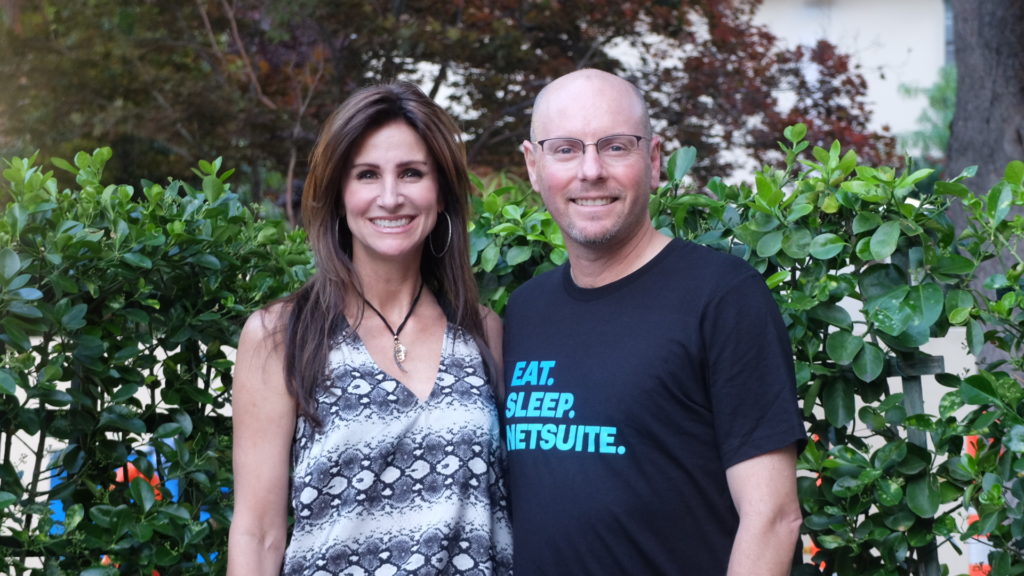SAN JOSE, Calif.—Among the illnesses all of us fear of having is cancer. And if you have the money, the passion, and the technology know-how to advance research about the Big C, you’ll definitely take an active role in fighting this disease, especially if you’re genetically-predisposed to it, like technopreneur Evan Goldberg.

NetSuite’s Evan Goldberg, along with his wife Cindy, have established the BRCA Foundation and committed $10M to accelerate positive health outcomes not only for his family, but the estimated X# of people in the U.S. who carry BRCA gene mutations. PHOTO: MELBA BERNAD
Applying the same entrepreneurial spirit that helped propel him to leadership in Silicon Valley, Goldberg is committed to blazing a trail toward better results in BRCA-related cancer outcomes.
Among the technologies eyed to help advance cancer research is Big Data. Big Data technology has helped companies find people, optimize experiences for us, and to sell to us more efficiently. Thus, for Goldberg, it makes sense to apply those kinds of technological breakthroughs to cancer research. Due to societal barriers to testing and a lack of a coordinated database of carriers, researchers are stymied in how they can help solve for these cancer types.
One of the foundation’s goals is to apply these so-called “Big Data” applications to BRCA research. By creating a registry and community for BRCA-mutation carriers, the foundation can not only find and connect them to the latest resources and information about their genetic risks, but can help researchers get faster access to the people and data they need in order to test their hypotheses and produce results for BRCA-related cancers.
Goldberg also noted that there is a need for a “social network” for BRCA mutations; one that opens conversations for affected communities and researchers so that they can more quickly and effectively put an end to genetically risky cancers.
Cutting-edge scientific research being done today will bring about the therapies, cures and preventative treatments that will save lives and improve quality of life of millions of BRCA-positive individuals.
In a backgrounder released to the press, the BRCA Foundation say it is committed to making this happen quickly. “We’re breaking down barriers between some of the top research institutions in the world, so that cancer scientists can move rapidly and efficiently – together – not in their typical competitive environment where they have little incentive to partner.
“We believe that researchers should spend their time on scientific discovery, not seeking grants. That is why our Foundation’s initial investment was to provide research grants to teams at UCSF, Stanford and Harvard to study BRCA-related cancer and to work together to share data and findings in their similar fields of study.”
About BRCA1 and BRCA2
BRCA1 and BRCA2 are genes that produce proteins that help repair damaged DNA. Everyone has these genes, but when there is a mutation on BRCA1 or BRCA2, DNA damage may not repair properly, which can lead to increased risk of cancer. Not everyone who carries these genetic mutations will develop cancer.
Currently, preventive options for BRCA1 and BRCA2 cancers are limited to radical, life-altering prophylactic surgeries, including mastectomies and removal of ovaries for women (e.g. the “Angeline Jolie” surgery). One of our aims is to improve the options for preventive care for BRCA1 and BRCA2 carriers.
Both men and women can carry the BRCA1 and BRCA2 mutations, and they can be passed down either by the mother or the father to either sons or daughters.
Who are at risk?
Ashkenazi Jews are more at a greater risk for BRCA gene mutations. Approximately 1 out of every 40 individuals of Ashkenazi Jewish ancestry has a BRCA1 or BRCA2 mutation, as compared to one out of every 800 members of the general population.
While the average woman in the U.S. has about a 12% risk of developing breast cancer over a 90-year lifespan, Ashenazi Jewish women have a lifetime risk of 36-85% of developing breast cancer by age 70.
Ashkenazi Jewish men who inherit abnormal BRCA1 or BRCA2 genes have a 6% risk of developing breast cancer, an 80% higher risk than the non-BRCA affected male population.
Men carrying abnormal BRCA1 and BRCA2 genes may also be three to seven times more likely than average to develop prostate cancer.
Other cancer risks, such as cancer of the skin or digestive tract, may also be somewhat higher among Ashkenazi men with BRCA mutations.
















































































































